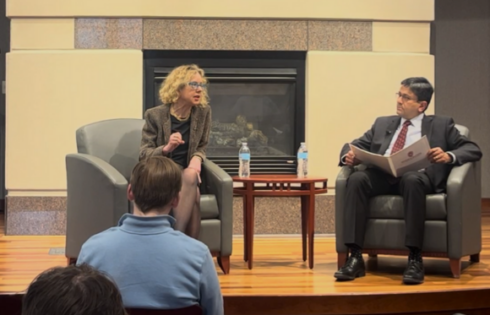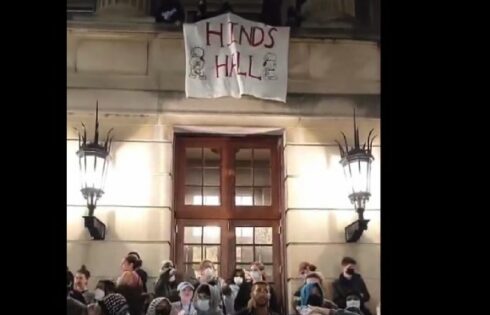
Enrollment is ‘sky-high’; student says: ‘The course inspired us’
6,000 pages of reading. Shakespeare, Melville, and Dante. Opera libretti from Beethoven, Mozart, and Wagner. In a university course from 1941, students were expected to consume all this and more in just one semester.
A syllabus from that class at the University of Michigan, taught by influential poet W.H. Auden, was discovered in 2012. It detailed an ambitious course filled with a staggering amount of work. The class, titled “Fate and the Individual in European Literature,” asked its students to read 32 books over the course of a single semester.
Now the decades-old syllabus has inspired the creation of a new class at the University of Oklahoma that proves that a “highly demanding sequence of classic works” can draw a large number of students.
Wilfred McClay, the G.T. and Libby Blankenship Chair in the History of Liberty at the University of Oklahoma, decided that stepping outside of his field of American history to create the class was worth it.
“I had a Great Books education as an undergraduate at St. John’s College, and felt comfortable with a great many of these books,” McClay told The College Fix in an email interview.
“I get very tired of hearing about how worthless the millennial generation is,” McClay said. He was frustrated by the reaction to Auden’s syllabus.
“I was struck by how many people automatically commented, ‘Well, students could never do something like that TODAY,’” he wrote. “And I felt myself bridle at that statement, and muttered to myself, ‘They might, if you challenged them with it.’”
McClay, along with his colleagues David Anderson, an English professor, and Kyle Harper, a member of the classics department and provost of the university, set out to create a two-semester course that emulated Auden’s.
McClay claimed that the three broke “every rule of the postmodern academy” in designing the class. He explained how in a piece for the James G. Martin Center for Academic Renewal.
They did so by “creating a highly demanding sequence of classic works, setting high expectations, and eschewing the grayness of theory and the reductionism of identity politics in favor of an intense engagement with the texts themselves.”
He told The Fix that the professors weren’t trying to cause a big sensation by starting the course. “We simply thought this would be a very engaging and innovative way of organizing a course dealing with the foundational works of the Western literary and intellectual tradition.”
McClay outlined the expansive scope and the schedule of the course in the article.
“The fall semester runs from Homer and Greek tragedy to the Renaissance. In the spring, we focus on modernity, beginning in the Enlightenment and ending in the mid-twentieth century,” he wrote.
The course took off once it was introduced in the fall of 2017. McClay said that Harper recruited students by telling them: “This is the hardest course you’ll ever take.”
The slogan worked. The course filled up, and McClay said that they have had to turn away students each semester it is offered.
The reaction from the faculty has been largely supportive, McClay said. A department chair warned of pushback, but given the course’s popularity, that never materialized.
“Our faculty colleagues have been genuinely supportive,” David Anderson wrote to The Fix. “Some, who have relatively little interest in canonical literature, are nevertheless stirred by the idea that students are eager to do so much reading, falsifying the charge that undergrads want to cruise through college, doing the bare minimum.”
Robert Bellafiore, a recent graduate who took the course, raved about its quality.
“The most important takeaway from the course was the importance of demanding excellence from others,” he told The Fix in an email.
“Our professors expected far more from my classmates and me than any other professors I’d had. They presented the course as a challenge and insisted that we could overcome it. Rather than overwhelming people and convincing them to give up, the course inspired us to rise to the occasion,” Bellafiore said.
“The enrollments for the course have been sky-high for every semester we’ve offered it,” McClay told The Fix. “Given the sad condition of humanities enrollments, that is a fact that speaks rather loudly.”
Anderson expressed uncertainty for how much longer the course will continue. But for him, the takeaways have restored hope in the next generation of students.
“It’s taught us something about how compelling the current generation finds serious books and rich ideas,” he wrote. “The course’s spirit will endure, and perhaps inhabit future classrooms at OU and elsewhere.”
MORE: Trump impeachment class offered again at San Diego State
IMAGE: Vipman / Shutterstock
Like The College Fix on Facebook / Follow us on Twitter





Please join the conversation about our stories on Facebook, Twitter, Instagram, Reddit, MeWe, Rumble, Gab, Minds and Gettr.